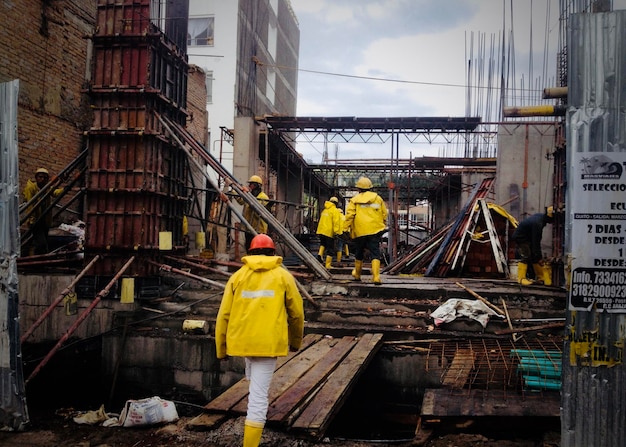Migrant Workers’ Rights in the US: Protecting Your Employment Legally

Migrant workers in the US have legal rights protecting them from exploitation and discrimination, ensuring fair treatment and safe working conditions under federal and state laws.
Navigating the US labor market can be challenging, especially for migrant workers. Understanding your legal rights is crucial for protecting yourself from exploitation and ensuring fair treatment. This guide breaks down the essential aspects of what are the legal rights of migrant workers in the US? A guide to protecting your employment.
Understanding Your Rights as a Migrant Worker in the US
Migrant workers are a vital part of the US economy, contributing significantly to various industries. It is imperative to understand that they are entitled to the same labor protections as US citizens. These rights are designed to ensure fair treatment, safe working conditions, and protection from discrimination, regardless of their immigration status.
Federal and state laws provide a robust framework of protections for migrant workers. These laws address issues such as wages, working conditions, and protection from discrimination. Some of the key laws that protect migrant workers include the Fair Labor Standards Act (FLSA), the Migrant and Seasonal Agricultural Worker Protection Act (MSPA), and Title VII of the Civil Rights Act.

Key Federal Laws Protecting Migrant Workers
Understanding the specific legal frameworks is essential for migrant workers to assert their rights effectively. Federal laws provide a broad spectrum of protections that cover various aspects of employment.
- Fair Labor Standards Act (FLSA): This act establishes minimum wage, overtime pay, recordkeeping, and child labor standards affecting full-time and part-time workers in the private sector and in Federal, State, and local governments. It ensures that migrant workers are paid at least the federal minimum wage and receive overtime pay for hours worked over 40 in a workweek.
- Migrant and Seasonal Agricultural Worker Protection Act (MSPA): MSPA provides protections to migrant and seasonal agricultural workers concerning wages, working conditions, housing, and transportation. It requires employers to provide written disclosures of the terms and conditions of employment.
- Title VII of the Civil Rights Act: This prohibits employment discrimination based on race, color, religion, sex, or national origin. It protects migrant workers from discriminatory practices in hiring, firing, promotion, and other employment terms and conditions.
These laws form the cornerstone of legal protections for migrant workers in the US. Understanding these laws is the first step in ensuring fair treatment and safe working conditions.
Wage and Hour Rights
One of the most critical aspects of labor rights concerns wage and hour protections. Migrant workers are often vulnerable to wage theft and other unfair labor practices. It’s crucial to be aware of your rights and how to assert them.
Federal and state laws dictate minimum wage, overtime pay, and other wage-related protections that apply to all workers, including migrant workers. Employers must comply with these laws, and failure to do so can result in legal consequences.
Minimum Wage and Overtime Pay
The Fair Labor Standards Act (FLSA) sets the federal minimum wage. Many states also have their own minimum wage laws, which may be higher than the federal rate. Employers must pay whichever rate is higher.
Overtime pay is another critical protection under the FLSA. Migrant workers are entitled to overtime pay at a rate of one and a half times their regular rate of pay for hours worked over 40 in a workweek. Certain exemptions may apply, particularly in agricultural work, but it is important to understand the specifics of these exemptions.
Addressing Wage Theft
Wage theft occurs when employers fail to pay workers the wages they are legally entitled to. This can take many forms, including paying less than the minimum wage, failing to pay overtime, or making illegal deductions from wages.
- Keep Accurate Records: Maintain detailed records of your hours worked and wages paid. This documentation can be invaluable if you need to file a wage claim.
- Understand Your Pay Stub: Review your pay stubs carefully to ensure that you are being paid correctly. Look for any unauthorized deductions or discrepancies.
- Seek Legal Assistance: If you believe you have been a victim of wage theft, consult with an attorney or a labor rights organization. They can help you understand your legal options and file a claim with the appropriate agency.
Protecting your wage and hour rights is essential for ensuring fair compensation for your work. Do not hesitate to seek assistance if you believe your rights have been violated.
Workplace Safety and Health
Ensuring a safe and healthy work environment is another fundamental right for all workers, including migrant workers. The Occupational Safety and Health Act (OSH Act) requires employers to provide a workplace free from recognized hazards.
Migrant workers often face hazardous working conditions, particularly in industries such as agriculture and construction. Understanding your rights related to workplace safety is crucial for protecting your well-being.
OSHA and Workplace Safety Standards
The Occupational Safety and Health Administration (OSHA) is the federal agency responsible for enforcing workplace safety standards. OSHA sets standards for a wide range of hazards, including exposure to toxic substances, machinery hazards, and fall protection.
Employers are required to comply with OSHA standards and provide training to workers on how to identify and avoid workplace hazards. Workers have the right to report safety concerns to OSHA without fear of retaliation.
Common Hazards and Preventive Measures
Migrant workers should be aware of the common hazards in their industries and the preventive measures they can take to protect themselves.

- Agriculture: Hazards include exposure to pesticides, heat stress, and machinery-related injuries. Preventive measures include using personal protective equipment, taking frequent breaks in the shade, and receiving proper training on equipment operation.
- Construction: Hazards include falls, electrocution, and struck-by injuries. Preventive measures include using fall protection equipment, following safe electrical practices, and maintaining a safe distance from heavy machinery.
- Manufacturing:Hazards include exposure to hazardous chemicals, repetitive motion injuries, and machine guarding violations. Preventive measures include using proper ventilation, implementing ergonomic workstations, and ensuring machines are properly guarded.
Staying informed and proactive about workplace safety can significantly reduce the risk of injury and illness.
Protection Against Discrimination
Discrimination in the workplace is illegal and harmful. Migrant workers are protected from discrimination based on race, color, religion, sex, national origin, age, and disability.
Understanding your rights and how to recognize and report discrimination is essential for creating a fair and inclusive work environment.
Federal Laws Prohibiting Discrimination
Several federal laws prohibit employment discrimination. Title VII of the Civil Rights Act is the primary law prohibiting discrimination based on race, color, religion, sex, and national origin. The Age Discrimination in Employment Act (ADEA) protects workers aged 40 and older from age discrimination. The Americans with Disabilities Act (ADA) prohibits discrimination based on disability.
These laws apply to all aspects of employment, including hiring, firing, promotion, pay, and other terms and conditions of employment. Employers cannot treat migrant workers differently based on their protected characteristics.
Reporting and Addressing Discrimination
If you believe you have been a victim of discrimination, it is important to take action.
- Document the Discrimination: Keep detailed records of the discriminatory incidents, including dates, times, and descriptions of what happened.
- Report the Discrimination: File a complaint with the Equal Employment Opportunity Commission (EEOC) or a similar state agency. The EEOC is responsible for investigating and resolving discrimination complaints.
- Seek Legal Assistance: Consult with an attorney who specializes in employment law. They can help you understand your legal options and represent you in a discrimination claim.
Taking a stand against discrimination not only protects your rights but also helps create a more equitable workplace for all.
Housing and Transportation Rights
For many migrant workers, housing and transportation are essential components of their employment. The Migrant and Seasonal Agricultural Worker Protection Act (MSPA) provides specific protections related to housing and transportation.
MSPA requires employers who provide housing to migrant workers to ensure that the housing meets certain safety and health standards. Employers must also provide safe and adequate transportation to and from the worksite.
Standards for Housing
MSPA sets minimum standards for housing provided to migrant workers. These standards address issues such as sanitation, ventilation, and structural integrity.
Employers must ensure that housing is free from pests, has adequate plumbing and sewage disposal, and is structurally sound. Workers have the right to inspect the housing and report any violations to the appropriate authorities.
Safe Transportation Requirements
MSPA also sets requirements for the safe transportation of migrant workers. Employers must ensure that vehicles used to transport workers are properly maintained and operated safely.
Drivers must be licensed and insured, and vehicles must meet certain safety standards. Workers have the right to refuse to ride in unsafe vehicles.
Understanding your rights related to housing and transportation ensures that you have access to safe and adequate living and working conditions.
Access to Legal Assistance
Navigating the legal system can be challenging, especially for migrant workers who may face language barriers and other obstacles. Access to legal assistance is crucial for protecting your rights and resolving disputes.
Several organizations and attorneys provide free or low-cost legal services to migrant workers. These resources can help you understand your rights, file claims, and represent you in legal proceedings.
Legal Aid Organizations
Legal aid organizations provide free legal services to low-income individuals and families. Many legal aid organizations specialize in labor law and can assist migrant workers with employment-related issues.
- The Legal Aid Society: Offers free legal services in various areas, including employment law.
- National Legal Aid & Defender Association: Connects individuals with legal aid providers across the country.
- American Immigration Lawyers Association (AILA): Provides resources and referrals for immigration-related legal services.
These organizations can provide valuable assistance in navigating the legal system and protecting your rights.
Finding an Attorney
If you need legal representation, it is important to find an attorney who is experienced in labor law and familiar with the rights of migrant workers. You can find an attorney through referrals from legal aid organizations, bar associations, or online directories.
When consulting with an attorney, be sure to ask about their experience, fees, and payment options. Many attorneys offer free initial consultations.
Access to legal assistance ensures that you have the support you need to protect your rights and seek justice.
| Key Point | Brief Description |
|---|---|
| 💰 Minimum Wage | Entitled to at least the federal or state minimum wage, whichever is higher. |
| 🛡️ Workplace Safety | Right to a safe and healthy work environment, free from recognized hazards. |
| 🚫 Non-Discrimination | Protected from discrimination based on race, color, religion, sex, or national origin. |
| 🏠 Housing Rights | If provided by the employer, housing must meet safety and health standards. |
Frequently Asked Questions
▼
Migrant workers are entitled to the same minimum wage as US citizens, which is set by federal and state laws. Employers must pay whichever rate is higher, ensuring fair compensation for all hours worked.
▼
If your employer is not paying you correctly, keep detailed records of your hours and wages. Report the issue to the Department of Labor or seek legal assistance from a labor rights organization.
▼
Yes, migrant workers are protected from workplace discrimination based on race, color, religion, sex, national origin, age, and disability. Federal laws like Title VII of the Civil Rights Act prohibit such discrimination.
▼
If your employer provides housing, it must meet certain safety and health standards. You have the right to inspect the housing and report any violations to the appropriate authorities to maintain a safe living environment.
▼
You can access legal assistance through legal aid organizations, bar associations, or online directories. Many attorneys offer free initial consultations to discuss your case and legal options for protecting your rights.
Conclusion
Understanding and asserting your legal rights as a migrant worker in the US is crucial for ensuring fair treatment and safe working conditions. By familiarizing yourself with the laws, keeping accurate records, and seeking assistance when needed, you can protect yourself from exploitation and discrimination, and contribute to a more equitable labor market.





